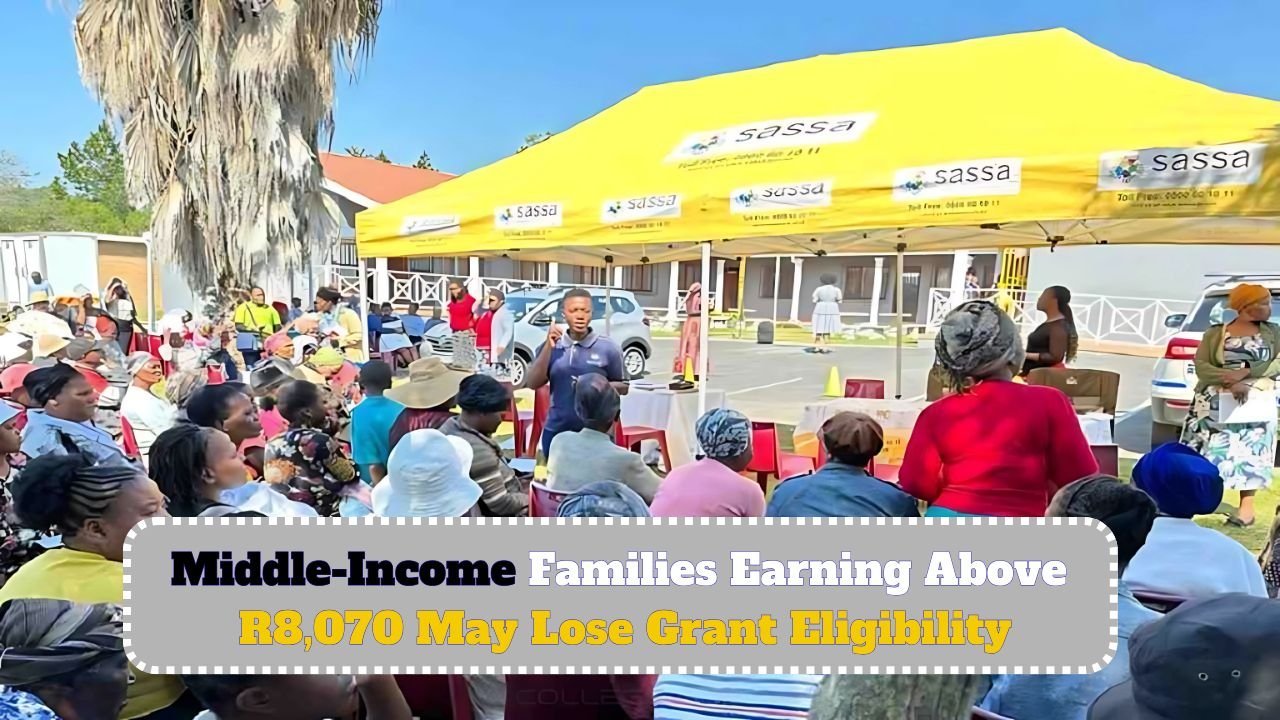South Africa’s social welfare system is undergoing a major shift this August as the South African Social Security Agency (SASSA) enforces a new income rule that may cut off benefits for thousands of middle-income families. Households earning more than R8,070 per month could see their access to various grants revoked. While the policy is designed to make grant distribution more efficient, the new threshold has raised anxiety among families who sit just above the line.
What Has Changed in SASSA’s Income Threshold?
The income limits for several major grants have been revised downward. SASSA’s updated policy now excludes individuals and families earning over R8,070 from receiving benefits that they may have previously qualified for. The changes impact major grants such as the Child Support Grant, Old Age Pension, Disability Grant, Foster Child Grant, and Care Dependency Grant.
This marks a significant shift from previous thresholds, some of which were closer to R9,000–R10,000. The policy aims to prioritize the most financially vulnerable groups, but it has also created a new financial burden for those considered “too rich to qualify, but too poor to cope without support.”
Grants Affected by the New Income Limit
Several popular grants will now apply the new income ceiling of R8,070, affecting eligibility across the board. Here’s a quick overview of how the limits have shifted:
- Child Support Grant: R9,000 → R8,070
- Old Age Pension: R10,000 → R8,070
- Disability Grant: R8,500 → R8,070
- Foster Child Grant: R9,500 → R8,070
- Care Dependency Grant: R8,800 → R8,070
Each of these grants plays a crucial role in supporting households across the country, particularly in areas where employment opportunities are limited and the cost of living continues to rise.
The Financial Strain on Middle-Income Families
Middle-income families now face a new financial reality. For many, these grants served as vital support to cover essentials such as food, electricity, school fees, and transportation. The loss of even one grant could mean the difference between managing monthly expenses or falling behind.
With inflation rising and fuel and grocery prices continuing to climb, these families are finding it increasingly difficult to cope without additional government assistance. Many are considering second jobs, cutting back on basic services, or dipping into savings just to stay afloat.
How Families Can Adapt to the New Rules
Families impacted by the new SASSA rule can take proactive steps to reduce the financial stress. Budgeting will become more important than ever, and reducing unnecessary spending could help offset the loss of grants. It may also be helpful to:
- Reassess monthly household expenses
- Look into local support programs or NGOs
- Participate in community financial literacy workshops
- Speak with a financial advisor or social worker for guidance
- Monitor any updates or exceptions that may be introduced
Planning ahead could soften the blow of losing a grant, even if it doesn’t fully replace the value of the lost support.
Why the Government Made This Change
According to government officials, the adjustment is part of a broader move to keep the social grant system sustainable. With the national budget under pressure and a growing demand for support, SASSA has been instructed to target resources toward the most economically vulnerable citizens.
While some view the move as fiscally responsible, others argue it ignores the realities faced by households just above the cut-off. These families are often not eligible for private assistance but also no longer qualify for government help. Critics say this could widen the gap between rich and poor.
Community Feedback on the New Threshold
Public reaction to the change has been mixed. Some community members agree that resources should be directed to the poorest families, especially in light of rising unemployment. Others, however, feel that the R8,070 threshold is too low to realistically reflect the cost of living in South Africa.
Community leaders and advocacy groups are calling on the government to reassess the policy or at least provide a transition period or appeals process for families suddenly excluded. In the meantime, social workers and welfare offices are reporting an increase in inquiries and complaints from confused and concerned citizens.
What the Future Holds for Social Grants
This income threshold revision could be a sign of more changes to come. As the South African economy faces growing challenges, it’s likely that the government will continue to reevaluate its approach to social welfare.
The long-term impact of this rule will depend on whether it effectively redirects resources without neglecting families on the financial edge. Continued dialogue between policymakers, communities, and advocacy organizations will be essential to ensure fairness and balance in future policies.
Final Word
The new SASSA income threshold rule introduced in August 2025 marks a significant turning point for South Africa’s social welfare system. While the intention behind the policy is to ensure that limited resources reach those in greatest need, its sudden impact on middle-income families cannot be overlooked. Many households now face tough financial decisions and uncertainty about their future support.
As the nation adjusts to these changes, it’s crucial for affected families to stay informed, seek guidance, and explore alternative avenues of assistance. At the same time, open communication between the government and the public remains essential to ensure that social grant policies remain fair, inclusive, and sustainable in the long run.


